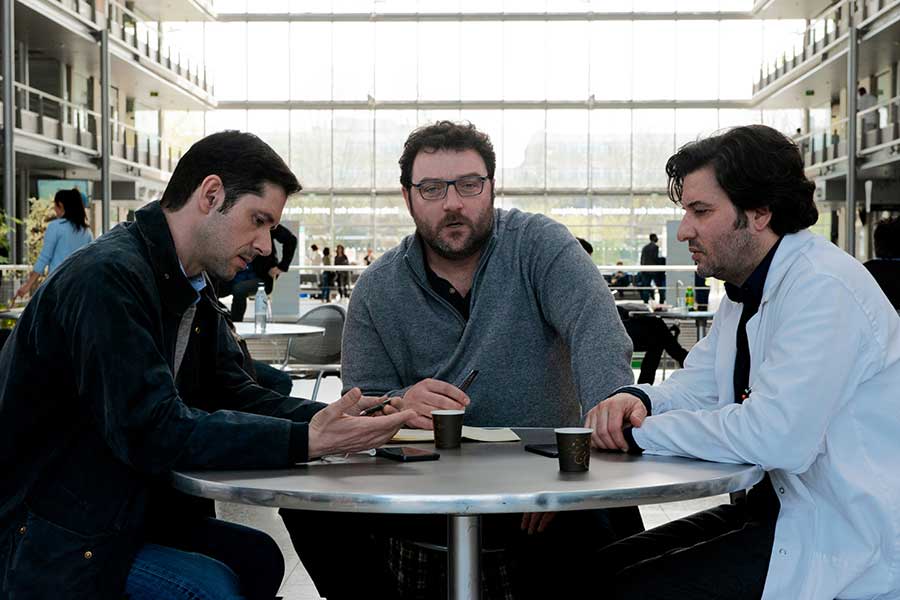Out gay director François Ozon’s exceptional drama, “By the Grace of God,” recounts the church’s recent child abuse scandal in Lyon. The film, which opens Nov. 8 at the Landmark Ritz at the Bourse, chronicles the efforts of several victims of pedophile priest Bernard Preynat (Bernard Verley), bringing the situation to light and demanding accountability from the Catholic church.
Ozon decided to make the film after discovering the testimonies of abused children. He met with victims, and his film depicts how they found the courage to speak out and organize to create change. “By the Grace of God” also illustrates the ripple effect child abuse has on each’s man’s family.
Ozon’s concerned approach thankfully never allows “By the Grace of God” to become too melodramatic or histrionic. In a recent interview, the director spoke with PGN about his absorbing film.
Did you grow up with a strong connection to the church?
I had a Catholic education as a child. It was a good education. I enjoyed it because I learned many things. But I lost my faith during my adolescence when I saw how the church could be hypocritical about sexuality.
It is difficult for people who have been abused to share stories. It’s more than just shame; it’s a loss of trust and faith; it’s about feeling weak and vulnerable. What are your observations about the impact of this?
When I met the victims, it was moving to hear the survivors telling me the intimate stories of their families when they decided to speak out. I saw that an abused child is a ticking time bomb. Their [trauma] affects everyone in the family. The parents, the brothers and sisters, and even their children feel guilty. The film is about the repercussions of abuse for all members of the family.
You have a striking scene of Alexandre (Melvin Poupaud) recounting the story of his abuse. Other scenes depict the young Bernard Preynat on a camping trip with the children in the film. Can you talk about the decision to both tell and show the abuse?
We were deciding if we needed flashbacks or not. Talking with the survivors, it was important to show the abuse and the circumstances of that — where it happened, how it could happen, etc. The children were paralyzed at the time. They don’t understand what is happening. They are like the lamb in front of the wolf. I wanted these flashbacks to show the tragedy of the child in front of the adult who is abusing him.
You take an interesting approach to telling the story, first through letters, then through actions, documenting how the cases each unfolded. Can you discuss your approach to the sensitive material?
The approach was suitable for each character. Alexandre was sober and very polite; François (Denis Ménochet) is looking to fight; Emmanuel (Swann Arlaud) is suffering. The “mise-en-scène” is close to the soul of each character. I wanted to be with each man and share his emotions. When I introduce a new character, I give audiences two minutes with him to create an emotional link.
“By the Grace of God” encourages victims to speak out. Can you talk about that?
I hope it does. In France, the film was successful and had a big influence. People came out and spoke out. I know some new victims spoke for the first time. When you are abused, you think you are alone, and when you share your suffering and fight together, you realize you are not alone. In the film, Emmanuel is reborn. This [activism] helps him survive.
How was your film received in France and/or by the church?
The church was afraid before the release, but when they saw the film, they were nice to me because they understood I respected the faith. I was earnest. The film shows the point of view of the victims, and the [church] discovered how much these men suffered. In the end, the film was supported by the Catholic community; they came to see it. Many Catholics are upset by the situation, and they thanked me. They want things to change.
What has changed?
Many things. After the release of the film, [Cardinal] Barbarin was condemned, and the priest [Preynat] was defrocked. People realize how much pedophilia can be a crime. Change is slow, but it is happening.
Do you think it’s possible for victims to find closure or healing? I
t takes time. It’s a long fight, but some are able. It depends on social background. For some, it destroys them for their entire life, and some victims commit suicide.
